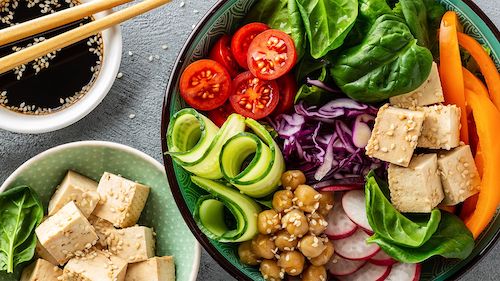When following a vegan diet, there are several key nutrients that you should pay attention to in order to ensure you’re meeting your nutritional needs. These nutrients include:
- Protein: Plant-based, vegan protein sources like legumes (beans, lentils, chickpeas), tofu, tempeh, seitan, edamame, quinoa, and certain grains are important for muscle repair and growth, as well as overall body function.
- Iron: Plant-based sources of iron include dark leafy greens (spinach, kale), legumes, tofu, tempeh, quinoa, fortified cereals, and dried fruits. Iron is essential for oxygen transport and energy production in the body.
- Calcium: Plant-based sources of calcium include fortified plant milk (soy, almond, rice), tofu, tempeh, leafy greens (collard greens, kale), calcium-set tofu, sesame seeds, and almonds. Calcium is crucial for bone health and various other body functions.
- Vitamin B12: Vitamin B12 is primarily found in animal-based foods, so it’s important for vegans to ensure adequate intake through fortified foods like plant-based milk, breakfast cereals, or nutritional yeast, or by taking a B12 supplement. Vitamin B12 is important for nerve function and the production of red blood cells.
- Omega-3 fatty acids: Plant-based sources of omega-3s include flaxseeds, chia seeds, hemp seeds, walnuts, and algae-based supplements. These essential fatty acids support brain health and have anti-inflammatory properties.
- Vitamin D: While the body can produce vitamin D through sun exposure, it can be challenging to obtain enough from sunlight alone, especially in certain geographical regions or during the winter months. Vegans can consider vitamin D2 or vitamin D3 supplements derived from plant sources.
- Zinc: Plant-based sources of zinc include legumes, whole grains, nuts, and seeds. Zinc is important for immune function, wound healing, and proper growth.
- Fibre: A vegan diet tends to be naturally high in fibre due to the abundance of plant-based foods. Fibre promotes healthy digestion and can help prevent certain diseases.

